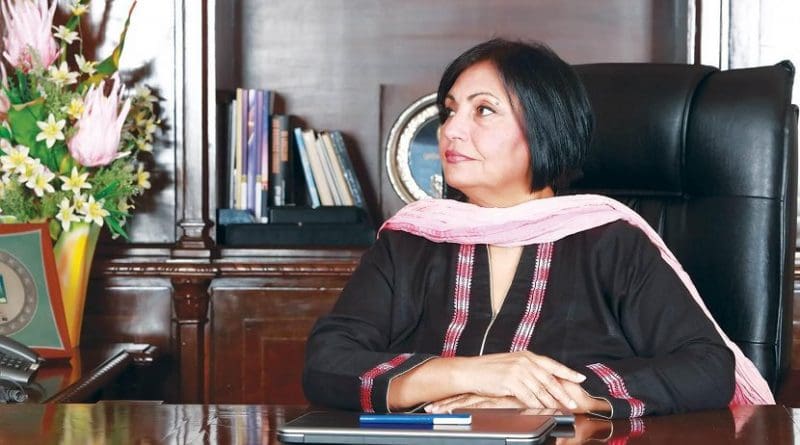First Women Bank: Empowering Women Financially – Interview
First Women Bank (FWB) is a unique financial institution, a Scheduled Commercial Bank, set up in 1989 by the Islamic world’s first woman Prime Minister Benazir Bhutto (Shaheed), who wanted a bank that would meet the banking needs of women. Its mission is. “To be a sustainable bank offering efficient, cost effective and need based financial products and services with special focus to address women’s banking needs through strategic alliances. Improve governance through capacity building and restructuring of the Bank”.
Ms. Tahira Raza, is a seasoned Banker, she assumed the office of President and CEO of First Women Bank Limited (FWB), in April 2014. Prior to this she served NBP as Group Chief Risk Management wherein 2012 she became the first woman in the history of NBP to reach the position of Senior Executive Vice President and Group Chief. Ms. Raza started her career with MCB and in 1989 she opted to join the First Women Bank when she became one of the founding executives of FWBL.
Raza holds MBA (Banking and Finance) degree from the Institute of Business Administration (IBA) Karachi and DAIBP from the Institute of Bankers in Pakistan.
Following are the excerpts from an exclusive interview of Ms. Tahira Raza.
Would you like to term First Women Bank a unique entity or just like any other commercial bank?
Tahira Raza: I would like to term First Women Bank (FWBL) a unique entity because of its charter which is, “Undertaking the conduct of all forms of business of Banking Company in a manner designed to meet the special needs of women and to encourage and assist them in promotion and running of trade and industry and practice of profession.” However, it is also a fact that FWBL is being regulated like any other commercial banks, which puts extra burden on Bank, as like any business it is set for profits. There is no funding stream committed for FWBL to perform development activities. Therefore it has to operate on purely commercial basis and generates its resources from the same market on competitive terms.
How would you review the performance of FWB spread on nearly three decades?
Tahira Raza: Coming back to FWBL is coming back home. A lot has changed during this period as well as its business model. I accepted the challenge to transform the bank, increase its outreach and above all make it an entity that offers superior quality services. I believe that Bank has created a mark but its dual mandate and inadequate capital has hampered its growth to meet both the objectives.
What have been the most pressing needs or challenges?
Tahira Raza: The most pressing or first and foremost challenge was to meet the MCR as it was related to Bank’s existence, which has been reset by State Bank of Pakistan. Now the Bank is required to maintain paid-up capital (net of losses) of PKR 3 billion and Capital Adequacy Ratio (CAR) of 18% at all times. Although reducing MCR from Rs. 10 billion to Rs. 3 billion is not the solution it only helps address regulatory noncompliance issue. The other big challenge is its structure that is compatible to meet its dual objectives. If an organization itself is not financially stable, it cannot serve its purpose. Another challenge is high non performing loans portfolio which continues to cannibalize the efforts to grow its business.
FWB also had the mandate of developing women entrepreneurs, how this objective is being achieved?
Tahira Raza: FWBL ever since its inception has had to meet two targets; the social development of women and the Banks commercial interests by being economically and commercially viable. This dual responsibility makes FWBL different from other Banks that are only commercially focused. Despite all difficulties and against all odds, FWBL has managed to carve a niche for itself.
However, I would like to dispel the misconception about FWBL that it’s primarily set up to lend to improve women’s access to credit alone. It is set up to focus on providing full spectrum of banking services to women that includes savings, trade related facilities, money transfer etc. Therefore assuming that all women must enter into business and become entrepreneurs is not correct, just like all men cannot venture into business.
It seems that FWB has bid farewell to some of its activities pertaining to the development of women entrepreneurs, has the Bank outsourced some of its activities?
Tahira Raza: When you have limited resources you prioritize. The development activities require longer gestation periods whereas it is a choice between staying alive and letting others survive. Of course staying alive requires that limited capital is diverted to commercial operations. However, bank has not done away with development activities which it is still pursuing but only to the extent of availability of developments funds.
How do you plan to increase FWB footprint in the country?
Tahira Raza: It is true that in rural areas brick and mortar marketing strategy still play a key role. However, deployment of technology has helped in overcoming the limited number of branches. FWBL is also working with telecommunication companies and Fintech to achieve financial inclusion. One of the major achievements is collaboration between FWBL and Aurat Foundation to achieve greater financial inclusion of women. Introduction of ‘Mera cash Meri sahoolat’ enables the account holders to get easy cash-backed loans to meet personal needs. The borrower can get minimum Rs 50,000 loan of one to five year term offered at competitive mark up rate with the ease of quick processing.
In your views what should be done for empowering women financially?
Tahira Raza: Start treating them equal, give them same freedom to learn, express and exercise choices.

